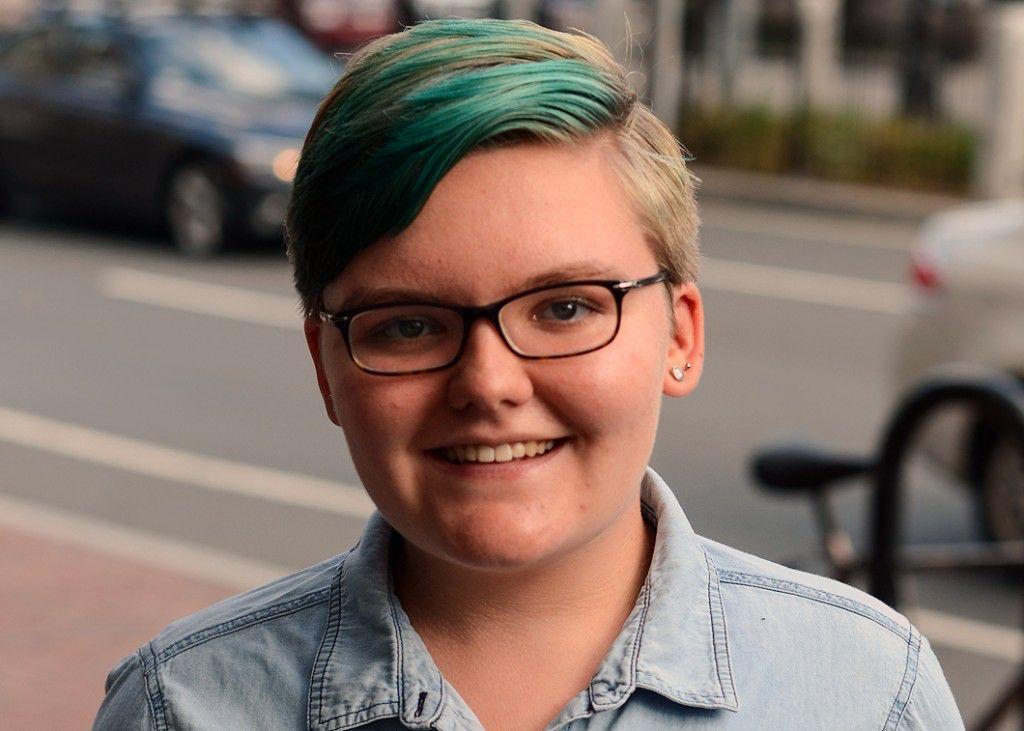For most people, going to church is a spiritual experience. Church is a place where people come together in a community to celebrate life. By that definition, though, my church is a little unconventional.
My spirituality is revitalized at spoken word poetry performances. Spoken word performances are where I form a spiritual connection with the world around me. Poems are my scripture.
On Sunday night, my absolute favorite poet came to Boston. Her name is Andrea Gibson, and her game is to blow the world away with the beautiful words that spill out of her mouth.
Andrea Gibson is a queer activist and poet. I could listen to her poems for hours on end. In fact, that’s exactly what I did in high school and in college. She writes about love, feminism, war, sexuality, gender and identity. I always joke that she knew I wasn’t straight before I knew I wasn’t straight. Something about her poems always resonated with me, even when I didn’t know what that was.
Gibson had previously visited Boston (and performed at Boston University), and I was even offered a ride to her show in Northampton last year. Both times, sadly, I was working, and I was devastated that I could not see my favorite poet perform.
This year, I was determined not to let that happen. I was planning to travel to Amherst to visit a friend and to see Gibson’s show in Northampton Sunday, but then she announced her Boston show and I decided to get tickets to that one instead.
My best friend from BU joined me on my adventure to see Gibson. She likes spoken word poetry, but wasn’t as familiar with Gibson’s work. Nonetheless, I was grateful that I wouldn’t have to spend a social outing alone.
We arrived at The Middle East Restaurant and Nightclub in Cambridge pretty early and waited outside. The venue is covered in mural art and is very hip — it was exactly where I’d expected Gibson to perform. While waiting, I ran into three different people I knew, which made me wonder if it was because I’m really popular or because the gay community is that small.
Queer folks surrounded us. It was exciting (hey, these are my people!), but also incredibly overwhelming. There were so many people and we were packed into the general admission section. I had never seen so many undercuts in my life.
There were people of all ages. While most of them seemed to be in their late teens and early 20s, I also saw quite a few people in their 40s or later. There was this cute couple that was probably in their 60s who also came. This performance brought a lot of people together.
When Gibson finally took the stage, it was surreal for me. She was actually there. She sounded the same as she did in all of the YouTube videos I spent so many hours watching. She stood on stage, tattoo-covered with an overgrown short haircut, playing with her hat. She was fidgety and honest and genuine.
Poetry performances are intimate enough that most poets feel comfortable on stage being vulnerable and unscripted. I’ve been to shows where poets tell personal stories and get emotional. Gibson’s show was no different.
Gibson ended up performing three of my favorite poems she has written: “Maybe I Need You,” “Blue Blanket” and “I Do.” She also performed some newer material, all of which never strayed from her style and sense of self.
One of the reasons I love spoken word so much is that it is a channel that amplifies minority voices. It’s not about how much money the poems make, such as with songs and films. Instead, it’s an art form that dares to trek through territory that no one has entered before.
Spoken word has really become a means to bring people together. It not only gives queer people and other minorities a voice through the poet, but it also creates a community. It’s a way to connect people and help them to not feel alone. It connects communities that aren’t visible.
Spoken word can also be a good way to get introduced to a new community and learn about others’ cultures and experiences. You can learn about it by listening to poets, but you don’t necessarily have to engage right away and become overwhelmed by what you don’t know. It can be a good starting point and introduction for people who might be afraid to ask questions or who just don’t know where to start.
Poetry and other forms of art are important vehicles for movements and communities that are not mainstream. When we are not represented and our stories are not told in the media, we have to find our own way to share our narratives. Spoken word poetry is empowering and emotional. It is a catalyst for change within society because the poets and community, instead of the culture, determine the content.

























































































































